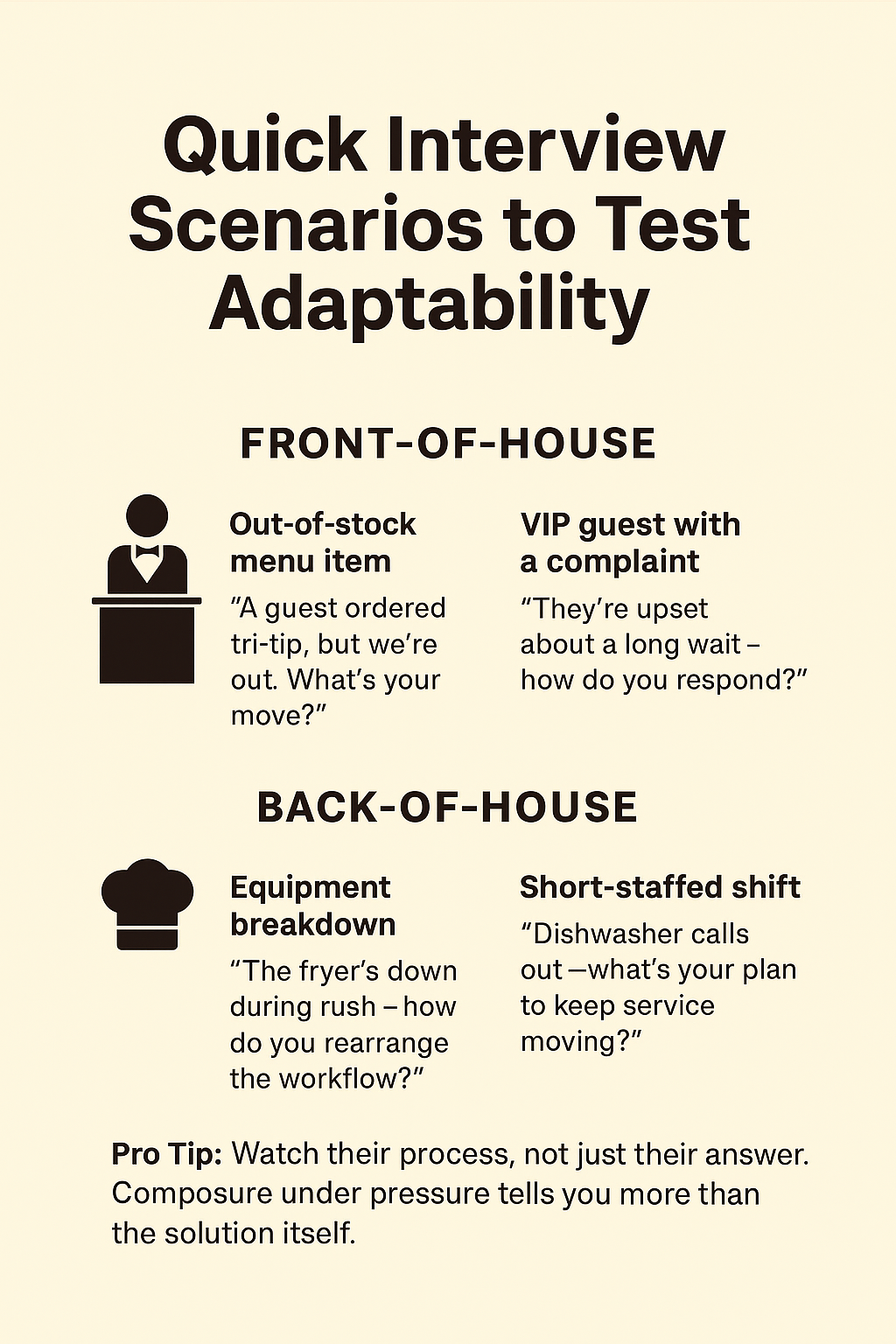Stop Hiring the Wrong People: Five Important Traits Managers Often Overlook
4 Min Read By John Waters
Let's face it, hiring restaurant staff has always been challenging, but in today’s job market, finding the right employee can be like searching for a needle in a haystack. When interviewing potential employees, there are several factors to consider, including availability and work experience. There are, however, several traits that hiring managers tend to overlook, which can lead to high turnover rates, increased costs, and a potentially poor work environment. Here is a list of unique qualities I tell every restaurant manager to look out for when hiring new staff.
Creative Thinking
This is the most overlooked trait when interviewing candidates. Employers tend to forget that in this industry, there’s often not a formula for when things go wrong. You need to have people on your team who know how to navigate around problems to keep operations running smoothly and guests satisfied. Emergencies happen at restaurants all the time, yet so many owners don’t screen a candidate's ability to think on their feet in a high-pressure situation. They hire them because they are available, then let them sink or swim. Figure out if they can think creatively and adapt quickly before you hire them.
During the interview, present them with a situation and see how they answer. If someone who made reservations orders a tri-tip steak and it’s out of stock, how would they solve it? Would they offer a different cut? Would they give them a certificate to come back? Or would they just say we’re all out of that? Do the same exercise for back-of-house positions. If a fryer is down, how would they rearrange to keep things moving smoothly? The way they respond will give you great insight into how they’ll be able to problem-solve on the job creatively.

Composure and Adaptability
Being able to shift from any position at any time in a fast work environment isn't just a bonus, it’s essential in this industry, and it’s important that they’re able to do it while remaining level-headed. Things can change on a dime: The dishwasher, arguably one of the most critical roles, might leave mid-shift due to being sick, or the busser can call out, putting more responsibility on the front of house staff. In moments like these, the team’s ability to pivot can make or break the entire operation.
That’s why it’s essential for managers to consider the behaviors that indicate whether they are truly adaptable, rather than just taking their word for it during the interview. Creating a disruptive environment can be beneficial. Things like having a couple of managers pop in to interrupt the interview, and creating a scenario where you have to move a few times mid-answer, is a good way to see how adaptable and level-headed they truly are. Are they able to stay on track with what they’re saying? Are they still listening to you, or are they a bit overwhelmed and looking around everywhere while you talk?
Emotional Intelligence
Emotional intelligence is crucial in this industry, especially for front-of-house staff. This individual will be one of the many faces of your establishment, interacting with the general public and shaping their experience. This requires more than just a good customer service voice, it’s important they can actually navigate around how the customer is feeling. Not to mention collaborating with a diverse team, all with different personalities, backgrounds, and communication styles. It’s important that the person you hire can emotionally manage that.
During the interview, ask them to elaborate on a time they had a negative experience with a coworker or manager. See if they take any ownership for the negative relationship or if they just blame the other individual. It’s kind of like dating, if you’re sitting down with somebody and they’re just bashing their ex the entire time, that’s probably not an emotionally intelligent person you want to continue getting to know. The same can be said for this scenario.
Core Values Must Match the Company Culture
It is crucial that their values align with the restaurant's culture. If they don’t align with the values and overall vibe of your restaurant, they won't perform well, leading to higher turnover. Recipes, POS systems, and holding drink trays can be taught. Good character and core values can’t. Prioritize them over all else.
Ask them about their core values as a person and evaluate how well they align with your restaurant's culture. We live in a fast-paced world, and often people forget to think about these things, which can lead to less hospitable service. They need to be able to stop and smell the roses sometimes to truly enjoy being there and give their guests the best experience.
Curiosity
Ensure the candidate is genuinely interested in learning more about the restaurant. Take some time during the interview to ensure they have done their homework. Ask them if they had a chance to look over the restaurant's core values. If a parent company owns your restaurant, ask if they’re familiar with the other restaurants. This will give you an idea of how much time they really took into getting prepared as well as where their head is at when it comes to being curious about the company.
Restaurant owners often overlook these qualities because they don’t go into the interview with the right intentions, and they fail to set up scenarios. Availability and previous experience are both very important factors when interviewing candidates, but they are not the only factors. You need to screen for traits that indicate a potential employee’s fit within the broader culture of your company. You need to screen for traits that not only demonstrate good customer service but also the ability to navigate tense situations adeptly, while understanding the needs of not only your customers but also your other employees. Focusing only on surface-level traits will lead to hiring workers who only superficially fit the requirements. You, your staff, and your customers deserve more than an employee who just shows up.

